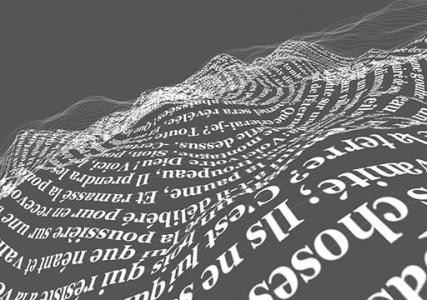Well Read: Humanities Computing and the Horizons of the New(-ish) Literary Macrocriticism

2010 was the year that the digital humanities really caught the eye of the Grey Lady, but the New York Times has been no less attentive to new DH initiatives in 2011. Most recently, the paper's Book Review introduced a new feature, The Mechanic Muse, dedicated to exploring the relationship between technology and literature, and the first installments in the series offer a pair of interesting takes on things afoot in the philological vein of humanities computing.
Kathryn Shulz's inaugural piece dropped in on Italian literary scholar Franco Moretti and his colleagues at Stanford's Literary Lab. Going back at least as far his "Conjectures on World Literature", published in the New Left Review in 2000 (and still essential reading), Moretti has derided what he sees as the inherently limited--even provincial--perspective that the critical practice of close reading forces on its practitioner. In the NRL piece, Moretti cites the work of the Annales school historians and the world systems theorist Immanuel Wallerstein, and he appropriates Max Weber's assertion that "new 'science' emerges where a new problem is pursued by a new method." By 2000, Moretti had come to see world literature as a problem, and in his "Conjectures" he proposed "distant reading" as a new (and newly scientific) methodology for tackling that problem.
In the years that followed, Moretti's new methodology gradually came into focus, and the 2005 publication of Graphs, Maps, Trees: Abstract Models for a Literary History marked the debut of distant reading as something more than conjecture. Moretti was proposing a new criticism of visualization, mapping, and taxonomy--a big-picture analysis of morphologies and forms. As the eminently readable Elif Batuman put it in a fine essay in n+1, Moretti was groping his way towards a "science of fiction".
Naturally, Moretti's new science found its way to computing, and Moretti became perhaps the most renowned in a surprisingly long line of humanities scholars who have harnessed the power of the processor in the hopes of achieving an analytic capacity that transcends the limits of traditional criticism. At the Stanford Literary Lab, books are studied like gene sequences, and researchers look for an underlying logic--a system that undergirds, or better still that upends, traditional ideas about genre, form, and structure.
While Moretti's methodology remains bracingly provocative, the success to date of the distant reading approach to literature remains debatable. Schulz's assessment of the Literary Lab's recent work, in fact, makes many of the same points that Robert Tally made in his critique of Graphs, Maps, Trees: Abstract Models for a Literary History for Modern Language Quarterly in 2007. For her own part, Schulz remains sceptical that the practice of distant reading--despite its panoptic sample size--will really be able to tell us anything terribly interesting about literature.
And maybe she's right. Maybe literature will refuse to be understood as a system or system of systems, and maybe Moretti's attempts at a unified theory of fiction will be frustrated. And maybe that's because Moretti's new science isn't asking the right questions.
A more recent Mechanic Muse article by the linguist and lexicographer Ben Zimmer suggests that perhaps the new data-mining philology will tell us less about literature than about the language on which that literature is built. Surveying some of the new historical work (much of which we've discussed here on THL) being done with the Corpus of Contemporary American English, the Oxford English Corpus, and Google's n-gram viewer, Zimmer convincingly argues empircally verifiable patterns exist in the language of fiction that serve to distinguish it from the languages of other forms, blog posts for example.
Literature, it seems, may not be reasonably expected to behave systematically, but the language of literature, in fact, can be. And while it's doubtless too early (and moreover, not very sporting) to rule out the possibility that Moretti's computational approach will yield real insights into the history and construction of "systems" in world literature, it seems likely that the data-mining impulse of the new-ish criticism and philology will ultimately find language--that great ur-system--itself to be the most appropriate and richest subject.